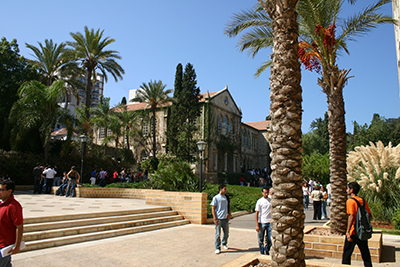
For World Refugee Day, Dr Mohammed Jawad offers a unique insight into the refugee crisis from his secondment at the American University of Beirut.
20 June is World Refugee Day, and my short morning walk to the American University of Beirut (AUB) provides a daily and grim taste of the global refugee crisis. At 8:50am I take a right out of my Beirut flat onto a bustling and polluted Lebanese street. I live opposite a cheap hotel that hosts medical tourists – Iraqis, mainly – due to crippling of health systems in the region. A quick glance to my left and I’ll see two women outside a supermarket holding babies and pleading with ingoing shoppers for a small bottle of milk. To my right I see a large but flattened cardboard box, knowing this will soon become the cushion for a young mother and her two children. I’ll see them on my way home and I’ll worry about the toddler, who looks thin and tends to wander into the road.
By 8:55am I’m on a steep descend towards the main entrance of AUB. As I pass by a beautifully colourful series of flower shops on my left, I see an elderly man in plain clothes sitting on a white, plastic chair and holding a cup of tea. He has an expressionless face, he has damaged red skin around his ankles, he is obese, and he is silent. We exchange a look and I feel despair; not just for him, but for the nine year old girl who used to be in his place up until April this year. Also silent, she would sit and curiously watch passers go by. She was from Aleppo, a city brought down to its knees in recent years, and she told me her mum wouldn’t let her go to school in Lebanon. I dare not ask the elderly man what happened to her, but let’s not be under illusions – gender-based violence and early marriage are a feature of armed conflicts.

On the home straight now and the main gates of AUB come into view. A few large bins to the right remind me of the young Syrian men who come out at night with electric torches in their mouths, rummaging through the rubbish to salvage something – anything – of value. At 8:57am a teenage boy asks if I want my shoes shined. I politely decline but now that I’ve made eye contact he’ll follow me and try to make a hard sale. He tells me he’s fasting in Ramadhan and needs money for his family’s evening meal. I take a final right, and can predict the pleading words that come from an elderly woman sitting on the floor: “May God protect you and help you flourish in your studies”, she says to passing students, asking for 1000 Lebanese lira (about 50p) for food. Her left leg is bandaged and she looks unwell. She seems desperate.
At 9:00am I get to my office and plan my day of research. I’m here to support the Lancet Commission on Syria, a large research project that aims to measure the regional and global public health impact of the Syrian conflict. It’s a complex project with multiple stakeholders, including international research groups, rooted in political tensions and poor quality data for research. Understanding the public health burden of war goes beyond counting the dead and injured in Syria, as chilling as these figures are, and I find myself involved in discussions around humanitarian aid, social welfare, labour market growth, protection of human rights, and health systems reconstruction.
The Middle East hosts about 40% of the 65 million refugees worldwide, and in Lebanon one in four people are refugees. The sunken reality is that there are no signs of armed conflicts resolving and the global refugee crisis is likely to worsen. Refugees have a massive potential to become productive members of society but until then they are among the most vulnerable of population groups. It is easy to get desensitised by big-hitting statistics on the refugee crisis, but my short morning walk is my reminder that there are real stories of real people behind the numbers.
Dr Mohammed Jawad is a PhD candidate at the Public Health Policy Evaluation Unit, studying the impact of armed conflict on non-communicable disease risk and management among Palestine refugees in the Middle-East. Currently seconded to the American University of Beirut, he also holds a medical degree and BSc in Management and Health Sciences from Imperial College London.